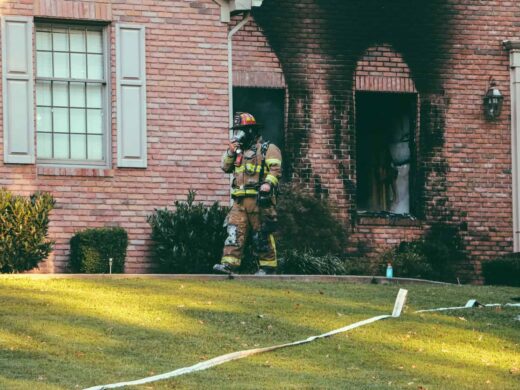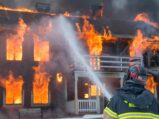National Fire Prevention Month 2022
Did you know that October is National Fire Prevention Month? It's the perfect time to brush up on your skills and make sure you're prepared in case of a fire occurs. Here are a few tips to help keep you safe and prepared in the event of a fire this fall.
National Fire Prevention Month is observed each October. Its purpose is to raise awareness about the importance of fire safety and to reduce the number of fires that occur each year. The tradition began in 1925 when President Calvin Coolidge proclaimed the first National Fire Prevention Week. The week was chosen because it coincided with the anniversary of the Great Chicago Fire, which occurred on October 8, 1871. Insurance companies also played a role in promoting fire safety during this period, as they were eager to reduce the number of fire-related insurance claims. In 1938, President Franklin Roosevelt declared the entire month of October to be National Fire Prevention Month.
Since then, various organizations have used the month of October to promote fire safety through public education campaigns and events.
How to help prevent fires in your home

House fires are one of the most common causes of property damage and injuries in the United States. In fact, according to the National Fire Protection Association, there are more than 350,000 residential fires every year. While many of these fires are small and easily contained, they can still cause a great deal of damage.
Here are a few tips to help you stay safe from fire in your home:
- Install smoke alarms on every level of your home, in and outside all sleeping areas. Make sure to test your smoke alarms monthly and replace the batteries at least once a year.
- Develop an escape plan and practice it with your family. Choose a meeting place outside that is a safe distance away and make sure everyone knows how to get there.
- Keep flammable materials like paper, curtains, and rugs at least three feet away from any heat source, including fireplaces, space heaters, and lamps.
- Never leave candles or cooking appliances unattended. Always extinguish candles before going to bed or leaving the room.
- Don't overload electrical outlets or extension cords. If you must use extension cords, make sure they are rated for the amount of electricity they will be carrying.
By following these simple safety tips, you can help protect your home and family from fire hazards.
What to do if a fire breaks out in your home
If you ever find yourself in the unfortunate circumstance of an active fire in your home, here are some simple steps to take:
- If you discover a fire, try to stay calm and act quickly.
- If the fire is small and confined to one area, attempt to extinguish it using a fire extinguisher or a bucket of water.
- If the fire is large or spreading rapidly, evacuate immediately and call 911.
- When evacuating, be sure to close all doors or windows behind you to help contain the fire.
- Once you are safely outside, do not reenter the building until the fire has been extinguished by authorities.
By following these simple steps, you can help minimize the damage caused by a house fire.
How to create a fire escape plan for your family
A fire escape plan is an essential part of any household safety plan. In the event of a fire, every second counts, and having a plan in place can help your family get out quickly and safely.
There are a few key things to keep in mind when creating your fire escape plan. First, make sure everyone in the family knows at least two ways to exit the house. In the event that you can't get to your children, teach them how to escape on their own. Designate a meeting spot outside where everyone can regroup once they've escaped. Second, practice your plan regularly at least twice a year. This will help everyone remember what to do in the event of an emergency. Finally, make sure to keep your escape routes clear of clutter at all times.
By following these simple steps, you can ensure that your family is prepared in the event of a fire.

The importance of having smoke detectors in your home
Smoke detectors are an essential part of any home safety plan. They are inexpensive, easy to install, and can alert you to a fire before it has a chance to spread. Smoke detectors can be battery-operated or hardwired into your home’s electrical system. The smoke alarm in your detector should be loud enough to wake you up if there is a fire in your home. Smoke detectors should be placed on every level of your home, in and outside every bedroom, and near any potential fire hazards, such as the kitchen or laundry room.
You should test your smoke detectors monthly to ensure that they are working properly. It is also a good idea to replace the batteries in your smoke detectors twice a year. By taking these simple steps, you can help protect your family from the dangers of fire.
How to check your fire extinguishers

Fire extinguishers are an essential part of any fire safety plan, but they need to be regularly checked to make sure they are in working order.
The first step is to check the gauge to see if the needle is in the green zone. If it is not, the extinguisher needs to be replaced. Next, you should check the pressure release valve to make sure it is not damaged or obstructed. Finally, inspect the hose to see if it is cracked or leaking. If any of these components are damaged, the extinguisher will not work properly and could even pose a safety hazard. Checking your fire extinguishers on a regular basis will help to ensure that they will be ready to use in the event of a fire.
Fires can happen unexpectedly and often lead to disaster. It does not have to be fire prevention month for you to take these proactive steps to make sure you are prepared in the event of a fire. With a little bit of planning, you can help keep your family safe in the event of a fire.
If you experience a property loss claim due to fire or any other type of property claim, don't hesitate to reach out to us for help. Our team of experts are here to help you get back on your feet.




